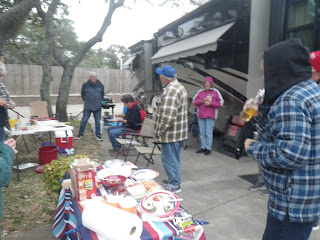Once you get a new camera lens you just have to use it a lot, and so we made another trip to the Aransas National Wildlife Refuge for another day of birding. Before we arrived at the park Renita took over the driving and I attached the 150-600 mm telephoto lens to the camera.
I cradled it in my lap and almost as soon as we entered the refuge,
we spotted an American Kestrel. Renita stopped the car in the middle of the road,
and I jumped out with the camera, (well I did not really jump). The Kestrel
landed on top of a large brush and I shot away hoping for a good image. The
image is one of the best bird images I have ever taken as both the resolution
and color are spot on.
As we neared the Heron Flats Trail a red shouldered hawk landed in a tree and I took quite a few images. From there we drove on till we reached Jones Lake. The lake had filled since the last time we were there, and other than a snowy egret, a sandpiper, and several far away ducks was pretty much a disappointment.
Our next stop was at the Towers and the Big Tree Trail. There another kestrel was hunting above an open field and I did manage to get a shot of it in the air. We walked into the trees on the Big Tree Trail but decided to return to the Towers, hoping to find a clapper rail, (no luck there).
The lower tower was devoid of anything, so we trudged up the high tower. Along the way a greenish warbler made a few tantalizing appearances, but it did not stop in one place long enough for me to take an image. All I ended up photographing was oak tree leaves.
The view from the top of the tower is nice but the whooping crane pair that claims the territory below is usually really far away. This time we spotted two wade fisherman and a boat next to the open field and marsh and it took awhile before Renita spotted the pair of whoopers in a place; we had never seen them before. I took a couple of images and then decided to take some images of the turkey vultures in the area.
Renita brought my attention back to the whoopers and they were moving to the edge of the bay. As we watched they leapt into the air and flew low across the bay.
They reached the shore, and they flew near the boat and one of the wading fishermen. Landing they were as close as we have ever seen them from the tall tower.
Our next goal was to check out the eagle’s nest along the eleven-mile road. If you do not know where it is, you can easily drive by it as it is a way off the road. It is about 5.6 miles from the start of the road and parking, we walked to a spot where we could see the aerie. It was still empty, and we wondered if the eagles had abandoned it or even returned to the area.
Finishing the one-way road, we returned to Herons Flat, parked the car and walked down the trail. The red shouldered hawk had taken a place in a large brush and I had to take the camera off autofocus.
Switching to manual I was able to refocus on the bird and not the branches and got a great shot of the hawk.
Walking further along the trail allowed us to see the two whooping cranes in the distance but they were along ways away.
There were some rosettes, a reddish egret, a great blue heron, a great egret, and a pair of pied billed grebes but the sun was wrong, and I could not get a good image. We did not see any alligators, unusual for the trail, as the trail is crisscrossed with alligator drags.
It was time to drive back home but before leaving the refuge we stopped in front of the refuge build to see if the resident alligator was at its usual spot. It was an appeared o be sleeping but it occasional opened its eye to see if we were close enough for it to get a birder.
Just as we drove out of the park, Renita spotted a flash of red and stopped the car. There we realized the small bird on top of the tree was a vermillion flycatcher. It was a great way to end the day and we hurried back home to upload the images into our photo program. It was a good day, and the results are the images used in this blog.
Clear skies













































